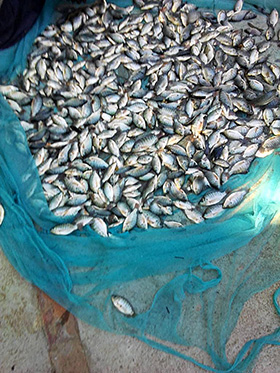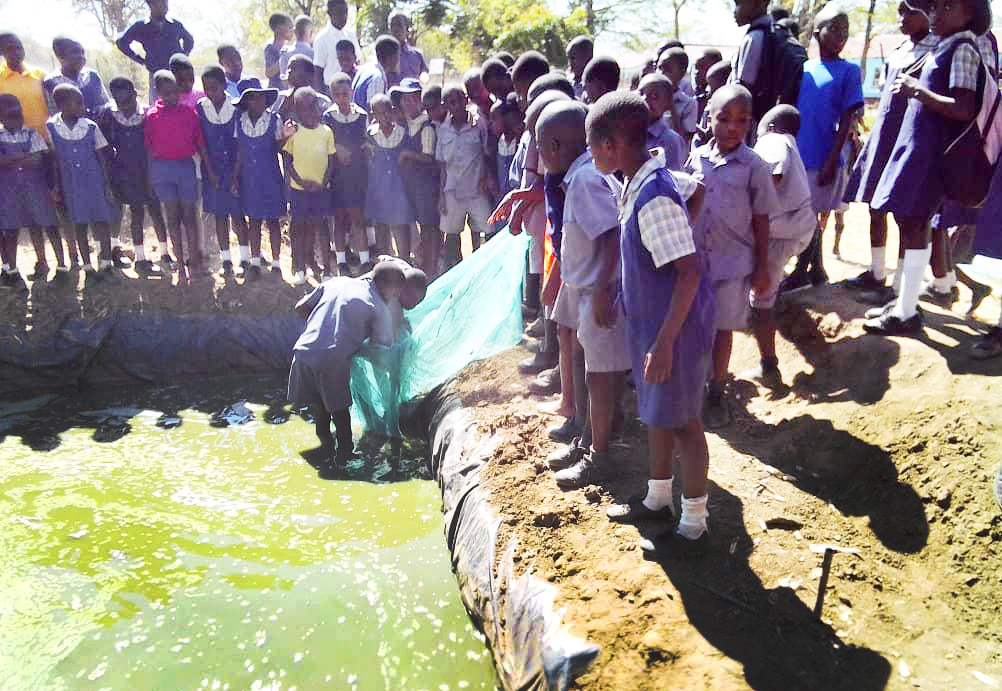Primary students at The United Methodist Church’s Nyadire Mission are helping feed their community through a fish-breeding project at the school.
Tirivangani Mabvute, Nyadire Primary School agriculture teacher, said the children started with 1,000 fingerlings, or juvenile fish, and expect to have 4,000 in May.
The fish were bought from Agrimarine Solutions with funds from the School Development Committee, a group of parents who manage the school’s fees and development fund.
“At a cost of $500, the project included construction of the pond, dam liners, fingerlings, fuel and fish pellets,” Mabvute said.
Nyadire Mission is the oldest United Methodist mission in Zimbabwe. It has primary and secondary schools, a college, hospital, orphanage, farm and workshop. The Nyadire Connection, a nonprofit founded by a group of United Methodists in Pittsburgh, Pennsylvania, provides continuing support for the mission.
Tendai Mushapaidze, Nyadire Primary headmaster, said the school invited Agrimarine Solutions to educate them on how to breed fish and to teach the students how to take care of them.
“Students did the feeding of the fish as directed by the agriculture teacher,” Mushapaidze said.

Students at Nyadire Primary School in Zimbabwe started with 1,000 fingerlings, or juvenile fish, and expect to have 4,000 by May, said agriculture teacher Tirivangani Mabvute. Photo by Chenayi Kumuterera.
Walter Mukuna, 12, said it was a good experience discovering how to breed fish, making a fishpond and learning the breeding stages.
“I can now teach my parents how to run a business of fish breeding,” he said.
“Agriculture is one of my best subjects,” Mukuna said. “(It is a) practical subject that’s easily mastered and it is rare to fail (in) subjects that you practice daily. It prepares children like us at primary level for our future, to be self-reliant with our parents at home, and when we educate them, (it) can be a source of money,” he said.
Most of the students also have learned how to manage agriculture projects such as gardening, raising poultry and dairy cows.
“Cortney Muchayi, 11, said the fish-breeding project has been great for students, especially as meat has become more expensive. She said not only has the project provided skills development, including learning to fundraise, but it also has improved the protein intake at the school.
“The project is worthwhile. We have sold 20 kilograms of the fish and have realized good profits,” she said.
Mabvute said fish-keeping is one of the major initiatives that the school has undertaken.
“We want this project to continue growing through pond expansion, training the kids to be real entrepreneurs by cultivating interest in them and making them feel that the project belongs to them. (We want) to make sure that every grade, from grade 4 to 7, has a pond.
“We are aiming to be one of the schools in Mutoko Mudzi District to breed and sell fingerlings to other schools and the community at large,” he said.
Mushapaidze agreed, adding that the school would like to have more ponds to produce the fish at a large scale.
“We have a lucrative market,” he said. “The current economic situation in Zimbabwe needs extra means to raise funds for sustainability, and fish breeding is the best way.
“Even though we do not have enough funds to buy materials to build big fish ponds, our vision is to have four ponds of different sizes, breed many fish, sell some and improve protein intake at the school.”
He is hopeful that there will be more money for the fish-breeding project in the future.
The Rev. Lancelot Mukundu, Nyadire Mission Station chairperson, is proud of the school’s endeavors.
“Nyadire Primary has done the best choice engaging in fish breeding, which will aid them in boosting their income and food at the school dining because it is one of the lowest-income departments. … This also helps them as they study their updated curriculum in agriculture.”
Kumuterera is a communicator for the Zimbabwe West Conference.
News media contact: Vicki Brown, news editor, [email protected] or 615-742-5469. To read more United Methodist news, subscribe to the free Daily or Weekly Digests.
Like what you're reading? Support the ministry of UM News! Your support ensures the latest denominational news, dynamic stories and informative articles will continue to connect our global community. Make a tax-deductible donation at ResourceUMC.org/GiveUMCom.




